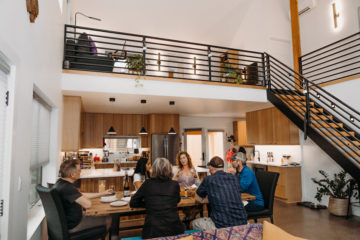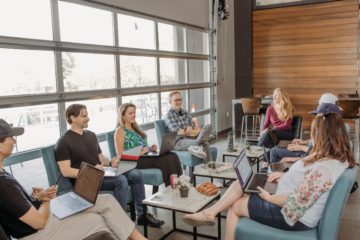What is it “OK” to do at OK (Opportunity Knocks)?
Before being bold. Before taking risks. Before embracing leadership. Before all of that, the members of our executive peer mentoring group say the most important thing to do when working with their peers to become better leaders of their business is to “be vulnerable.”
Vulnerability, according to many who study business and professional relationships, is key to success because it builds deeper relationships, creates loyalty, demonstrates authenticity and enables people to bring their whole self into their work environment. Friendship vulnerability has long been noted as a key trait of social connection, and the part it plays in business is believed to be just as important, creating an environment of trust, honesty, forgiveness and appreciation.
Once thought of as a possible sign of weakness or a shortcoming, studies have found that the opposite is true, and offering up oneself in such a manner can produce positive results. Opening up and sharing amongst peers and subordinates–though sometimes a difficult habit to create–builds deeper trust, better relationships and advanced engagement among work groups (or in our case, peer groups).
Dini Vemuri of Opportunity Knocks found the same to be true for her peer mentor group. “The small group conversations where each person shares their wins and hardships fosters a deep sense of trust. This allows for vulnerability in a way that’s difficult to build with colleagues, especially at small companies with hierarchical reporting structures.”
Being vulnerable is bold. People are designed to be naturally resistant to taking responsibility for one’s shortcomings and emotions while asking for help; all which can be extremely hard on one’s esteem. Left unchecked, the inability to be vulnerable can lead to a habit of blame, defensiveness or shame, squashing creativity, innovation and risk taking.
But being vulnerable is a sign of emotional intelligence. Those who are best at being vulnerable appear as curious, innovative and responsible for their own ego, asserting themself within their group or team because of the self confidence required in order to be vulnerable. Opening the door to vulnerability shines a light on our imperfect human condition. The idea that everyone makes mistakes and has the opportunity to learn and grow no matter our position, age or education builds bonds amongst individuals.
It’s this concept that is the root of a peer mentoring program like Opportunity Knocks. It starts with the notion that amongst a trusted group of peers and under an umbrella of confidentiality and credibility, executives and business owners can be open, honest and unguarded about their struggles, hardships, questions and shortcoming; by sharing experiences and listening to those who have had similar challenges. Along with shared experiences you’ll receive support, ideas, and friendship while working towards achieving a strengthened business community in Central Oregon.
So, if giving your vulnerable side some exercise in an attempt to become a better leader, boss or business owner is something you would like to try, bringing vulnerabilities to Opportunity Knocks is a great start and part of the model of success that has been working for community leaders and executives for decades. So, we ask once more, “What is it OK to do at OK?”
“At OK, it’s OK to be vulnerable and open about your business and life. It’s a phenomenal community that will challenge and push you to continually improve, optimize and build your dreams,” says Opportunity Knocks Member Matt Watson of Watson Creative.
So be bold. Take risks. Embrace leadership. Look into professional growth through groups like Opportunity Knocks. And lastly, be vulnerable.




